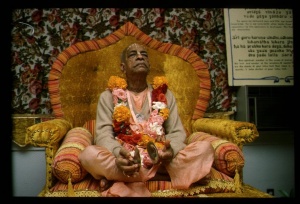SB 6.18.3-4

A.C. Bhaktivedanta Swami Prabhupada
TEXTS 3-4
- dhātuḥ kuhūḥ sinīvālī
- rākā cānumatis tathā
- sāyaṁ darśam atha prātaḥ
- pūrṇamāsam anukramāt
- agnīn purīṣyān ādhatta
- kriyāyāṁ samanantaraḥ
- carṣaṇī varuṇasyāsīd
- yasyāṁ jāto bhṛguḥ punaḥ
SYNONYMS
dhātuḥ—of Dhātā; kuhūḥ—Kuhū; sinīvālī—Sinīvālī; rākā—Rākā; ca—and; anumatiḥ—Anumati; tathā—also; sāyam—Sāyam; darśam—Darśa; atha—also; prātaḥ—Prātaḥ; pūrṇamāsam—Pūrṇamāsa; anukramāt—respectively; agnīn—fire-gods; purīṣyān—called the Purīṣyas; ādhatta—begot; kriyāyām—in Kriyā; samanantaraḥ—the next son, Vidhātā; carṣaṇī—Carṣaṇī; varuṇasya—of Varuṇa; āsīt—was; yasyām—in whom; jātaḥ—took birth; bhṛguḥ—Bhṛgu; punaḥ—again.
TRANSLATION
Dhātā, the seventh son of Aditi, had four wives, named Kuhū, Sinīvālī, Rākā and Anumati. These wives begot four sons, named Sāyam, Darśa, Prātaḥ and Pūrṇamāsa respectively. The wife of Vidhātā, the eighth son of Aditi, was named Kriyā. In her Vidhātā begot the five fire-gods named the Purīṣyas. The wife of Varuṇa, the ninth son of Aditi, was named Carṣaṇī. Bhṛgu, the son of Brahmā, took birth again in her womb.